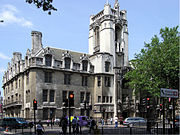Assange v Swedish Prosecution Authority
| Julian Assange v Swedish Prosecution Authority | |
|---|---|
 |
|
| Court | Supreme Court of the United Kingdom |
| Full case name | Julian Paul Assange v Swedish Prosecution Authority |
| Argued | 1–2 February 2012 |
| Decided | 30 May 2012 |
| Neutral Citation | [2012] UKSC 22 |
| Reported at | Assange v Swedish Prosecution Authority |
| Case history | |
| Prior action(s) | Assange v The Swedish Judicial Authority [2011] EWHC 2849 (Admin) |
| Procedural history | The judicial authority in Sweden v Julian Paul Assange (Westminster Magistrates) |
| Holding | |
| A European Arrest Warrant issued by a public prosecutor is a valid Part 1 warrant issued by a judicial authority within the meaning of section 2(2) and 66 of the Extradition Act 2003. | |
| Case opinions | |
| Majority | Phillips joined by Brown, Dyson, Kerr, and Walker |
| Dissent | Hale and Mance |
| Area of Law | |
| Extradition | |
Julian Assange v Swedish Prosecution Authority were the set of legal proceedings in the United Kingdom concerning the requested extradition of Julian Assange to Sweden to further a 'preliminary investigation' into accusations of his having committed sexual offences. The proceedings began in 2012 and on 12 August 2015, Swedish prosecutors announced that they would drop their investigation into three of the allegations against Assange, because the statute of limitations had expired. The investigation into the allegation of rape has, as of 19 May 2017, been dropped by Swedish authorities. A contentious issue over the course of the legal proceedings was the fear that Assange could ultimately be extradited to The United States should he be sent to Sweden.
On 20 August 2010, two women, a 26-year-old living in Enköping and a 31-year-old living in , went together to the Swedish police not seeking to bring charges against Assange but in order to track him down and persuade him to be tested for sexually transmitted diseases after having separate sexual encounters with him. The police told them that they could not simply tell Assange to take a test, but that their statements would be passed to the prosecutor. Later that day, the duty prosecutor ordered the arrest of Julian Assange on the suspicion of rape and molestation.
The next day, the case was transferred to Chefsåklagare (Chief Public Prosecutor) Eva Finné. In answer to questions surrounding the incidents, the following day, Finné declared, "I don't think there is reason to suspect that he has committed rape." However, Karin Rosander from the Swedish Prosecution Authority, said Assange remained suspected of molestation. Police gave no further comment at that time, but continued the investigation.
After learning of the investigation, Assange said, "The charges are without basis and their issue at this moment is deeply disturbing."
The preliminary investigation concerning suspected rape was discontinued by Finné on 25 August, but two days later Claes Borgström, the attorney representing the two women, requested a review of the prosecutor's decision to terminate part of the investigation.
On 30 August, Assange was questioned by the Stockholm police regarding the allegations of sexual molestation. He denied the allegations, saying he had consensual sexual encounters with the two women.
...
Wikipedia
